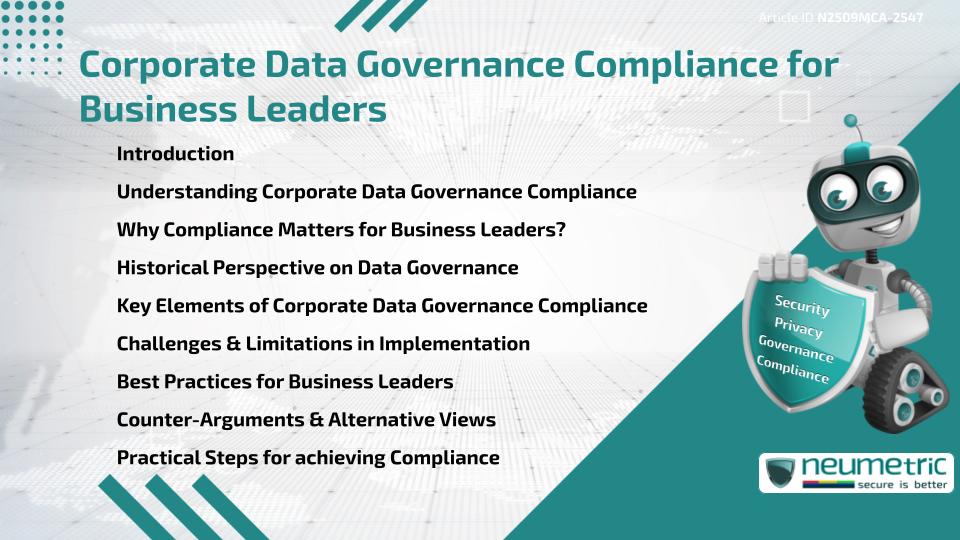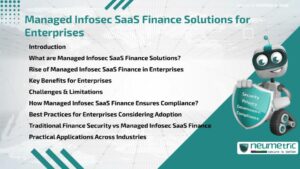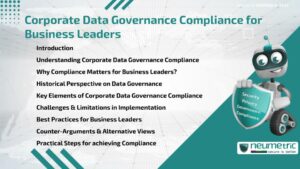Table of Contents
ToggleIntroduction
Corporate data Governance compliance is the structured practice of ensuring that organisations handle data responsibly, securely & in line with ethical & Regulatory Standards. For business leaders, it is both a strategic necessity & a safeguard against financial, reputational & legal Risks. This article explores what corporate data Governance compliance entails, why it is critical for modern enterprises & how leaders can effectively adopt it to protect Sensitive Data while ensuring transparency & accountability.
Understanding Corporate Data Governance Compliance
Corporate data Governance compliance refers to the alignment of data handling with laws, regulations & internal frameworks that define how organisations manage, store & use information. It includes everything from Data Security Policies to Access Controls & Audit mechanisms. Leaders must ensure that corporate practices not only meet legal requirements but also enhance Customer Trust by demonstrating Fairness, Transparency & Accountability.
Why Compliance Matters for Business Leaders?
Business leaders face growing pressure from regulators, Customers & Investors to maintain corporate data Governance compliance. Non-compliance may result in Financial penalties, loss of reputation & disruption of Business Operations. Conversely, compliance strengthens decision-making, enhances Business Continuity & ensures alignment with Business Objectives & Customer Expectations.
Data compliance is not merely a legal requirement; it is a competitive advantage in industries where Customer Information & trust drive success.
Historical Perspective on Data Governance
Data Governance has evolved significantly over the past decades. In the early days, businesses focused solely on storage & retrieval of data. The rise of digital platforms, increasing cases of Data Breach & the introduction of regulations such as the General Data Protection Regulation [GDPR] have transformed Governance into a broader Framework that emphasises Ethical Standards & regulatory enforcement.
Today, corporate data Governance compliance is about more than avoiding penalties. It is about embedding Governance Standards into the DNA of an organisation.
Key Elements of Corporate Data Governance Compliance
The core elements of compliance include:
- Policies, Technologies & Processes to manage Data Security
- Access Controls to limit data usage to authorised personnel
- regular Audits for monitoring compliance gaps
- Risk Management practices to identify potential Vulnerabilities
- Training Programs to educate Employees about their responsibilities
Together, these components ensure organisations protect Sensitive Data while adhering to Regulatory Standards.
Challenges & Limitations in Implementation
While corporate data Governance compliance is essential, it comes with challenges. These include:
- Limited resources for Small Businesses
- Complex industry-specific regulations
- Lack of Executive Buy-In
- Difficulty in balancing data access with Privacy requirements
Business leaders must address these limitations by investing in Employee Training, adopting Monitoring Tools & ensuring Continuous Monitoring & Improvement of compliance systems.
Best Practices for Business Leaders
To effectively lead compliance initiatives, business leaders should:
- Integrate compliance into strategic Business Objectives
- Use Standardised Frameworks such as ISO 27001 Certification
- Encourage Cross-Department collaboration
- Conduct regular Risk Assessments & Gap Analysis
- Promote a culture of responsibility around Data Protection
These Best Practices help leaders turn compliance into an enabler rather than a burden.
Counter-Arguments & Alternative Views
Some argue that corporate data Governance compliance slows down innovation due to added checks & reporting requirements. Others claim it increases operational costs. While these arguments hold weight, the broader perspective shows that non-compliance is far costlier, both financially & reputationally. Furthermore, proper frameworks often streamline Processes rather than hinder them.
Practical Steps for achieving Compliance
For leaders aiming to strengthen compliance, the following steps are useful:
- Conduct a Readiness Assessment to identify current gaps
- Define Policies aligned with Global Standards
- Implement Access Controls & Security Measures
- Carry out Internal & External Audits
- Establish a Business Continuity Plan to manage disruptions
By following these steps, leaders can ensure corporate data Governance compliance is not only met but sustained over time.
Takeaways
Corporate data Governance compliance is a cornerstone of responsible leadership. It protects Sensitive Information, aligns with Regulatory Standards & strengthens trust with Stakeholders. Business leaders must recognise that compliance is not optional but essential for long-term sustainability & growth.
FAQ
What is corporate data Governance compliance?
It is the practice of managing & protecting data in line with ethical & Regulatory Standards.
Why should business leaders care about corporate data Governance compliance?
Because non-compliance can lead to Financial penalties, loss of trust & disruption of Business Operations.
What are the key components of corporate data Governance compliance?
Policies, Technologies & Processes, Access Controls, Risk Management, regular Audits & Training Programs.
Does compliance slow down innovation?
Some argue it does, but in reality, it streamlines Systems, Processes & Services by making them more reliable.
How can Small Businesses achieve compliance?
They can start with Risk Assessments, simple Security Controls & gradual adoption of Frameworks such as ISO 27001 Certification.
What role do Employees play in compliance?
Employees must follow Security Policies, complete Training Programs & report potential Security Incidents.
How often should compliance be reviewed?
Organisations should carry out regular Audits & Continuous Monitoring & Improvement to stay aligned with Regulatory Standards.
Need help for Security, Privacy, Governance & VAPT?
Neumetric provides organisations the necessary help to achieve their Cybersecurity, Compliance, Governance, Privacy, Certifications & Pentesting needs.
Organisations & Businesses, specifically those which provide SaaS & AI Solutions in the Fintech, BFSI & other regulated sectors, usually need a Cybersecurity Partner for meeting & maintaining the ongoing Security & Privacy needs & requirements of their Enterprise Clients & Privacy conscious Customers.
SOC 2, ISO 27001, ISO 42001, NIST, HIPAA, HECVAT, EU GDPR are some of the Frameworks that are served by Fusion – a SaaS, multimodular, multitenant, centralised, automated, Cybersecurity & Compliance Management system.
Neumetric also provides Expert Services for technical security which covers VAPT for Web Applications, APIs, iOS & Android Mobile Apps, Security Testing for AWS & other Cloud Environments & Cloud Infrastructure & other similar scopes.
Reach out to us by Email or filling out the Contact Form…





